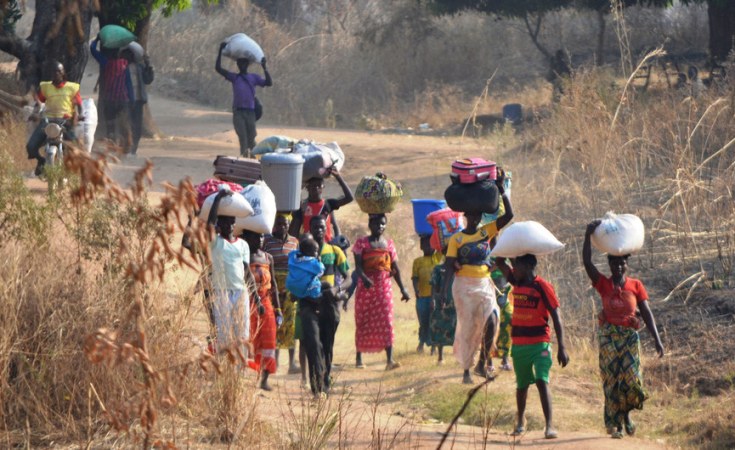More than a million people, including children, have fled their homes in the volatile Central Africa Republic to Cameroon. Not all have given up hope.
A bus throws up dust as it rumbles away from the sprawling expanse of the refugee camp at Gado-Badzere in eastern Cameroon. It's heading to the war-ravaged Central African Republic (CAR), just some 30 km (19 miles) away.
Inside the bus is a group of nearly 300 refugees who have chosen to return to their homeland.
Secondary school student Abdel Aziz is among those being voluntarily repatriated. He and his mother fled fighting the fighting in CAR five years ago; Aziz's father is believed dead.
Despite the country's turmoil, 16-year-old Aziz is determined to return home. He wants to continue his schooling and be part of the solution to the crisis afflicting his country.
"Now, I aspire to become a criminal investigative police officer to help fight crimes in society, like the war in the Central African Republic," Aziz told DW, before climbing the bus.
Many are too scared to return
But Yolanda, whose name has been changed by DW to protect her privacy, and her daughter won't be returning.
"Seleka rebels raided my home. They raped me and they raped my 14-year-old daughter," Yolanda told DW.
"Since I was a Christian before converting to Islam, I have become a target of the Seleka as well as the anti-Balaka. Both sides see me as a danger for them."
Rights organizations such as Amnesty International and Human Rights Watch have documented extensive cases of systematic rape at the hands of Seleka and anti-Balaka rebels and other armed groups.
Her daughter said returning would also be difficult because they don't have family there anymore.
While the 14-year-old diligently studies for her GCE Ordinary Level at the camp, her real dream lies beyond the classroom. She envisions a future where she can make a difference by helping young girls who, like her, have endured the harrowing realities of war.
"I want to become a councilor to guide young girls traumatized by war," she said.
"I thank God for protecting us to come out alive in this war. That is why I want to become a councilor to sensitize children to certain things."
More than a decade of violence
Central African Republic has been engulfed in conflict since 2013, when an alliance of predominantly Muslim rebels, known as Seleka, forced President Francois Bozize from office.
The Seleka rebels unleashed violence upon Christians, leading Christian youths to organize themselves into a militia known as the anti-Balaka. Despite the eventual ousting of the Seleka faction, a cycle of tit-for-tat violence persists between the two groups.
Meanwhile, the central government grapples with asserting its influence beyond the capital, Bangui. The situation has improved "in some areas in early 2024," finds a recent UNICEF report.
As a result of the volatile security situation, one in five of the country's 5.5 million population are displaced within and across CAR's borders.
In addition to the more than 500,000 internally displaced, some 725,000 people are seeking refuge in neighboring countries, with around 300,000 in Cameroon.
Edited by: Chrispin Mwakideu


